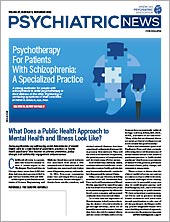Dr. Jones, a psychiatrist in private practice, described to me a conundrum she was trying to resolve. A patient she has been treating for eight years with psychotherapy and medication was recently certified as a therapist. The patient intends to terminate treatment with her and set up a private practice in the same district as the psychiatrist. The new therapist is asking for a collaborative relationship with the psychiatrist in which he would refer patients to the psychiatrist for medication management. The psychiatrist is not comfortable with the proposal and worries that her deep knowledge of her ex-patient’s flaws would negatively influence her view of the patient as a therapist. Most importantly, however, she is concerned about the risks of boundary violations and a breach in confidentiality, for example, when patients ask about the relationship between the psychiatrist and their referring therapist, as often happens.
The APA Ethics Committee has received questions about similar situations. One such question involved a patient who had received psychiatric treatment at an institution for years and was now applying to work as a clinician at the same institution a decade later. In this case, the Ethics Committee affirmed the need for psychiatrists “to support the concept that treatment matters and that people can recover and live full lives by addressing the challenges of mental illness. Psychiatrists should model that seeking treatment is a healthful and positive behavior and not a stigmatized act that will forever preclude a person, once a patient, from joining a team of respected mental health professionals. A history of mental health treatment should not be used to ban employment; a history of appropriate qualifications and pursuit of necessary medical treatment should be positive indicators for employment.”
Nonetheless, every such situation requires deep reflection to avoid potential ethics breaches. In some cases, the guidance is clear. For example, it is unethical for a psychiatrist in a solo private practice to employ a former patient because the pre-existing doctor-patient relationship is likely to influence the working relationship on both sides with potential negative consequences. In Dr. Jones’s case, however, the situation has ethics considerations that need to be addressed. Here is the advice that I gave to Dr. Jones: After celebrating her patient’s success, she should schedule a private meeting to discuss the contours of their new professional relationship. She should clarify that it would be a challenge to be his psychiatrist in the future should he suffer a relapse and need care. Further, Dr. Jones should point out that a personal relationship with a former patient could be unethical, especially if intimate, and therefore, all social interactions should be avoided as much as possible. When it is not possible to avoid them, they should carefully manage their interactions, social or professional, making sure boundaries are not breached. Dr. Jones should also discuss possible circumstances that could insinuate to others that she and the therapist had a prior treatment relationship as any such acknowledgment on her part would be a breach of her patient’s confidentiality. The fact that her former patient discloses their relationship to others does not absolve the psychiatrist of this ethical injunction. Such a discussion would prevent future problems and set the stage for the next chapter of their relationship.
The situation is different in the case of a former patient of an institution now seeking employment there. Staff members with whom the patient would work, especially those who had direct clinical roles in the patient’s treatment, would be rightfully concerned about boundary and other ethics issues. However, the institution is large enough that the former patient does not have to work directly with members of her former treatment team. As in Dr. Jones’ situation, the institution should include the new colleague in discussions regarding ethics concerns and get her input as to how she would like the concerns addressed.
In the APA Ethics Committee’s guidance, the committee enjoins the institution to “reflect on all its policies, whether for hiring or treatment, to assure that they minimize bias and support the opportunity for recovery and inclusion for those with mental illness.” The committee further recommends that “when a former patient is hired, the institution should consider addressing at the time of hiring where and with whom the former patient who becomes an employee would receive treatment were the person to have a relapse or recurrence of illness. It would be problematic for the former patient to be treated by her now professional colleagues. Instead, it should be agreed that the former patient who has become an employee would seek treatment at another facility if mental illness recurred or at the same institution only if the institution were large enough to preclude interaction with work colleagues in a treatment context.”
In summary, transitioning from a doctor-patient relationship to a professional-professional relationship poses significant ethics challenges. However, with careful planning and attention, the risks can be mitigated. ■

